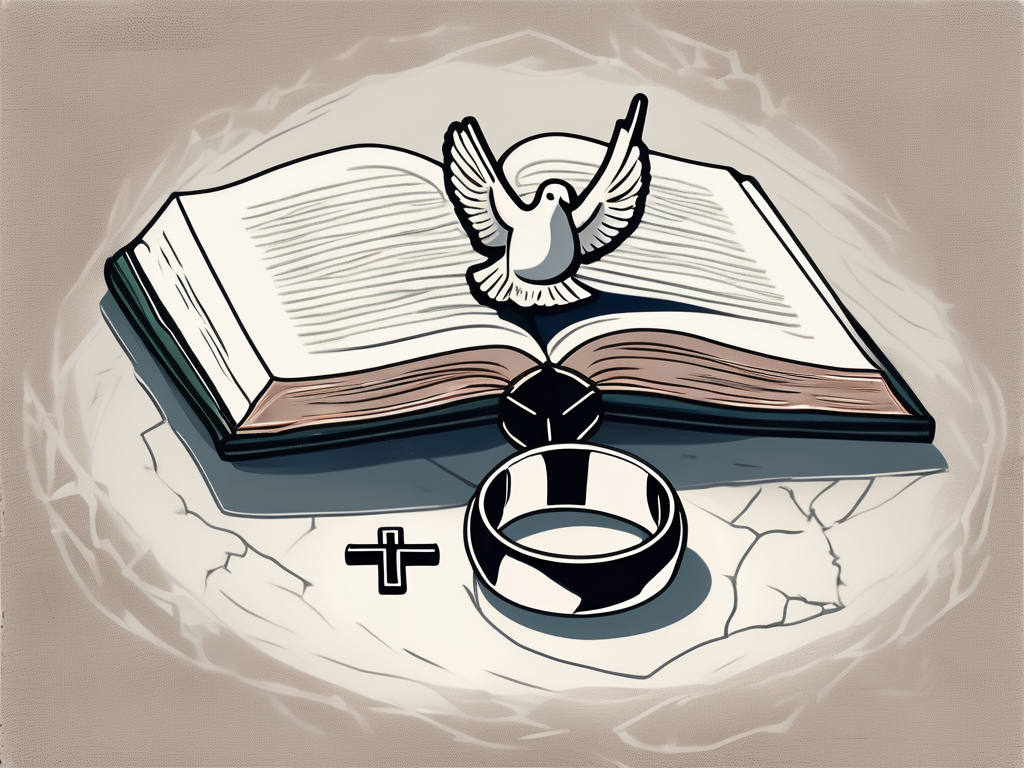Marriage is a sacred institution that comes with its fair share of challenges. No relationship is immune to problems, and couples often find themselves grappling with various issues. In times of marital strife, it can be helpful to turn to the Word of God for guidance and wisdom. So, what does the Bible say about marriage problems? Let’s explore some biblical perspectives on this topic.
Understanding the Biblical View of Marriage
Before delving into specific marriage problems, it’s crucial to understand the biblical view of marriage. The Bible teaches that marriage is a covenant between a man and a woman, intended to reflect the selfless love and commitment that Christ has for His church (Ephesians 5:22-33). It emphasizes the importance of unity, mutual respect, and sacrificial love within the marital relationship.
The Purpose of Marriage According to Scripture
In the eyes of God, marriage serves multiple purposes. Firstly, it is a means of companionship, providing support and encouragement to one another (Genesis 2:18). God designed marriage to be a source of comfort and companionship, where two individuals can find solace and strength in each other’s presence. This companionship extends beyond mere physical presence and includes emotional and spiritual support as well.
Additionally, marriage is designed for procreation and the establishment of a godly legacy (Genesis 1:28). God’s plan for marriage includes the blessing of children, who are seen as a heritage and a gift from the Lord. The union of a husband and wife is meant to create a nurturing environment for the growth and development of future generations.
Last but not least, marriage is meant to be a picture of the love and unity between Christ and His followers (Matthew 19:4-6). Just as Christ sacrificially gave Himself for the church, husbands and wives are called to love and serve one another selflessly. The marital relationship is a tangible representation of the intimate connection between Christ and His bride, the church.
The Role of Husband and Wife in a Biblical Marriage
The Bible outlines specific roles for husbands and wives within a marriage. Husbands are instructed to love their wives sacrificially, just as Christ loved the church (Ephesians 5:25). This sacrificial love goes beyond mere feelings or emotions; it is an active choice to prioritize the well-being and flourishing of one’s spouse. Husbands are called to be servant leaders, responsible for the spiritual well-being and protection of their families.
On the other hand, wives are encouraged to submit to their husbands’ leadership, respecting and supporting them (Ephesians 5:22-24). Submission does not imply inferiority or oppression, but rather a willingness to honor and affirm the God-given authority and responsibility that husbands have in the marital relationship. It is a partnership where both spouses work together, with the husband leading in love and the wife supporting and respecting his leadership.
In a biblical marriage, both husband and wife are called to selflessness, humility, and mutual submission to one another (Ephesians 5:21). They are to serve and love each other unconditionally, seeking each other’s best interests and striving to build a strong and God-honoring union.
Biblical Teachings on Conflict Resolution in Marriage
Conflict is inevitable in any marriage, but how we handle it makes all the difference. Let’s explore some biblical teachings on conflict resolution.
Marriage is a beautiful union ordained by God, but it is not exempt from disagreements and conflicts. However, the Bible provides us with guidance on how to navigate these challenges and find resolution.
The Importance of Forgiveness and Reconciliation
The Bible places great emphasis on forgiveness and reconciliation. It teaches that love covers a multitude of sins (1 Peter 4:8) and encourages believers to forgive one another just as Christ forgave them (Ephesians 4:32). In marriage, forgiveness is vital for healing and rebuilding trust.
Forgiveness is not always easy, especially in the midst of hurt and pain. However, when we choose to forgive our spouse, we mirror the forgiveness that God extends to us. It is through forgiveness that we can experience true reconciliation and restoration in our marriage.
Reconciliation requires humility and a willingness to let go of pride. It involves seeking forgiveness from our spouse and extending forgiveness to them. By embracing forgiveness and reconciliation, we create an environment of grace and love within our marriage.
Communication and Understanding in a Biblical Context
Effective communication is key to resolving conflicts in marriage. The Bible teaches us to be slow to speak, quick to listen, and slow to anger (James 1:19). By seeking to understand our spouse’s perspective and communicating with kindness and respect, we can work towards reconciliation and unity.
In the midst of a conflict, it is crucial to approach our spouse with a heart of humility and a desire to truly listen. This means setting aside our own agenda and actively engaging in empathetic listening. By doing so, we create a safe space for our spouse to express their thoughts and feelings.
Furthermore, the Bible encourages us to use our words wisely and to speak with gentleness and grace (Colossians 4:6). When we communicate in a biblical context, we avoid using hurtful or demeaning language that can further escalate the conflict. Instead, we strive to build each other up and seek understanding.
Additionally, seeking wise counsel from trusted mentors or seeking professional help can be beneficial in resolving conflicts. These individuals can provide guidance and perspective that can help us navigate through challenging situations.
In conclusion, the Bible provides us with valuable teachings on conflict resolution in marriage. By embracing forgiveness, reconciliation, effective communication, and seeking wise counsel, we can work towards resolving conflicts and strengthening our marriage bond. Remember, conflict is an opportunity for growth and deeper intimacy when approached with a biblical mindset.
The Bible’s Guidance on Infidelity and Betrayal
Infidelity and betrayal can cause deep wounds in a marriage. Let’s turn to the Bible for guidance on navigating these painful situations.
Marriage is a sacred covenant between a man and a woman, and infidelity goes against the very foundation of this covenant. The Bible makes it clear that infidelity is a serious violation of marriage vows (Exodus 20:14, Matthew 5:27-28). It is a betrayal of trust, a breach of the commitment made before God and witnesses. The pain caused by infidelity is often overwhelming, leaving the betrayed spouse feeling hurt, angry, and confused.
However, even in the face of such pain, the Bible also teaches forgiveness and offers hope for restoration (1 Corinthians 6:9-11). God’s Word reminds us that no sin is too great for His mercy and grace. It encourages the wounded spouse to seek solace in the Lord and find strength in His promises. Through prayer and seeking guidance from the Scriptures, couples facing infidelity can find direction and support as they work towards healing.
Dealing with Unfaithfulness: A Biblical Perspective
When confronted with infidelity, it is crucial to remember that God’s desire is for marriages to be restored and reconciled. The Bible provides guidance on how to navigate this challenging situation. It encourages open communication, honesty, and a willingness to address the underlying issues that led to the betrayal.
One biblical principle that can guide couples in dealing with unfaithfulness is the importance of confession and repentance. The unfaithful spouse must acknowledge their wrongdoing, take responsibility for their actions, and seek forgiveness from both God and their partner. The betrayed spouse, on the other hand, is called to extend forgiveness, just as God has forgiven us (Colossians 3:13).
Additionally, the Bible teaches that marriage is a reflection of Christ’s relationship with the Church (Ephesians 5:22-33). Just as Christ forgives and loves His people unconditionally, spouses are called to extend grace and love to one another, even in the midst of pain and brokenness. This does not mean that the betrayed spouse should ignore the hurt or pretend that everything is okay. Rather, it means that they should strive to imitate Christ’s sacrificial love and seek reconciliation.
Restoring Trust in Marriage: Biblical Insights
Rebuilding trust after betrayal is a challenging process that requires time, patience, and commitment from both spouses. The Bible provides valuable insights on how to restore trust in a marriage.
One biblical principle that can help in restoring trust is transparency. The Bible encourages spouses to be open and honest with one another (Ephesians 4:25). This means that the unfaithful spouse should be willing to answer questions, provide reassurance, and be transparent about their actions and intentions. It also means that the betrayed spouse should be allowed to express their feelings, ask for clarification, and have access to information that can help rebuild trust.
Another biblical principle that can aid in the process of restoring trust is accountability. Both spouses should be willing to seek guidance and support from trusted mentors, counselors, or spiritual leaders who can provide wisdom and accountability. These individuals can help the couple navigate the challenges of rebuilding trust, offer guidance on setting healthy boundaries, and provide a safe space for open and honest communication.
Ultimately, the journey of healing and restoration after infidelity requires a deep reliance on God’s guidance and grace. By seeking His wisdom through prayer, studying His Word, and surrounding themselves with a supportive community of believers, couples can find hope and strength to rebuild their marriage.
Financial Problems in Marriage: A Biblical Perspective
Money matters can place significant strain on a marriage. Let’s explore how the Bible addresses financial problems within the marital relationship.
Marriage is a sacred bond between two individuals, and it is no surprise that financial issues can arise in this union. The Bible, as a guide for life, offers practical wisdom and guidance on how to navigate these challenges. It encourages believers to be diligent in their work, emphasizing the importance of hard work and responsible financial management (Proverbs 21:5, Proverbs 22:7).
Furthermore, the Bible teaches the significance of generosity and contentment in the context of marriage. It warns against the love of money, emphasizing that the pursuit of wealth can lead to discontentment and even harm relationships (Matthew 6:24, 1 Timothy 6:10).
Money Management According to the Bible
The Bible provides valuable insights into managing finances within a marriage. It emphasizes the importance of being good stewards of the resources entrusted to us. This means making wise financial decisions, budgeting effectively, and avoiding unnecessary debt. By following these principles, couples can create a solid foundation for their financial well-being and strengthen their marital bond.
Moreover, the Bible teaches that financial management is not solely about accumulating wealth but also about using our resources to bless others. It encourages believers to give generously and cheerfully, knowing that God loves a cheerful giver (2 Corinthians 9:6-7). By adopting a mindset of generosity, couples can cultivate a spirit of selflessness and unity in their marriage.
The Role of Generosity and Contentment in Marriage
In times of financial stress, it is essential to cultivate an attitude of generosity and contentment. The Bible teaches that giving generously not only blesses others but also brings joy and fulfillment. When couples choose to give sacrificially, they experience the joy of making a positive impact on the lives of others and witness the transformative power of generosity in their own hearts (2 Corinthians 9:6-7).
Similarly, finding contentment in God’s provision allows couples to focus on what truly matters in their relationship. It is easy to get caught up in the pursuit of material possessions and financial security, but the Bible reminds us that true contentment comes from a deep trust in God’s faithfulness and provision. By placing their trust in God and finding contentment in Him, couples can navigate financial challenges with a sense of peace and unity.
In conclusion, financial problems can indeed place strain on a marriage. However, by seeking guidance from the Bible and applying its principles of diligent work, wise money management, generosity, and contentment, couples can overcome these challenges and build a strong and thriving marital relationship.
Navigating Emotional and Psychological Issues in Marriage
Emotional and psychological issues can significantly impact a marriage. Let’s uncover some biblical insights on navigating these challenges.
The Bible on Love, Respect, and Emotional Well-being
The Bible emphasizes the importance of love and respect within a marital relationship (Ephesians 5:33). It encourages spouses to treat one another with kindness, compassion, and patience. Furthermore, the Bible encourages believers to cast their anxieties on God and find comfort in His presence (1 Peter 5:7).
Dealing with Stress and Anxiety in Marriage: Biblical Advice
Marriage often faces external stressors that can lead to anxiety. The Bible offers solace by reminding couples to trust in God’s provision and to find peace in His promises (Matthew 6:25-34). It encourages couples to seek God’s guidance through prayer and to support one another in times of difficulty (Philippians 4:6-7).
In conclusion, the Bible provides invaluable wisdom and guidance for navigating marriage problems. By turning to the Scriptures, couples can find direction on understanding the purpose of marriage, resolving conflicts, dealing with infidelity, managing finances, and navigating emotional challenges. Through prayer, biblical study, and a commitment to living out God’s design for marriage, couples can find strength, healing, and restoration in the face of marital difficulties.












